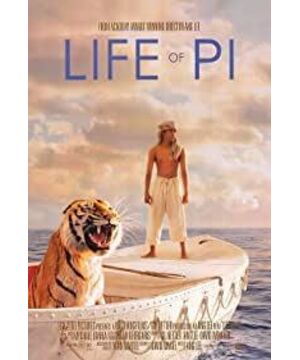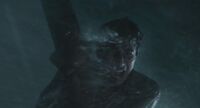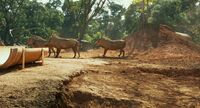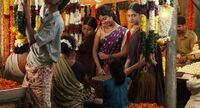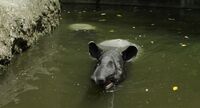The movie tells the story of Pi's family moving to Canada on a Japanese freighter with the zoo, but the ship was wrecked by a storm in Mariana, and the fantasy drifting story of Pi and the animals on the sea. The title will definitely be "Pi and Robinson's Fantasy Crusoe". The stories told by Uncle An are touching and funny. There are so many scenes worth pondering and scrutinizing, which makes people continue to reminisce when they walk out of the cinema. For example: the juvenile pie urinated on the tarpaulin of the boat in order to mark the site, but did not expect Richard Parker to be a more urinating tiger; the boat gang did not seek swords for carving the boat, but to record the 227 of each sunrise and the number of days. There are traces, and the juvenile Pi rushed to send out signal flares and final despair when he saw a cruise ship passing by; in the second storm, Pi shouted to the sky, why did you scare it and hide under the tarpaulin of the ship with the tiger , the sea water in the cabin kept rushing the two people together, and finally the tears shed when Pi hugged the tiger and the desolation and helplessness of only two people in the world.
The orangutan that made everyone laugh while sitting on the banana rushed over, and when the orangutan slapped the hyena, we and π shouted out heartily, but the happiness was too short-lived, and it was replaced by the shock of the hyena killing the orangutan. When I heard the middle-aged Pi tell the second story, the brutal cook wanted to hit Pi, but was slapped down by his mother, making Pi run away, but then Pi looked back and saw the picture of his mother being killed by the cook , When Pi told the first story, his expression was always calm. When I told the second story, I burst into tears. We also know that the role of taking the seat is restored: the zebra represents the rejoicing Buddhist sailor, which implies that he shouted zebra, zebra twice when he fell into the water. He said that bibimbap was not a meat dish, it was just a taste, and the black and white zebra also represented his duality. The orangutan represents a kind and brave mother who defends her child. When she got on the boat, Pi asked her where did your child go. And hyenas represent bad bandits, thug chefs who can't be called food without meat (here I think of Ji Xiaolan, who only eats meat without meat and the five daughters of the Japanese imperial family). The tiger in the play is called Richard Parker, which has the same name as three shipwrecks in history, and two of them were eaten by their companions. The tiger was named because it was drinking water by the stream and caught it. Its hunter, Richard Parker, named it Thirsty, but when it was sold to the Pi family's zoo, the file name was written backwards, the hunter wrote Thirsty, and the tiger wrote Richard Parker, the Pi family I thought it was funny, so the name has been used all the time. Fortunately, the tiger is not thirsty, otherwise a tiger drifting on the sea calling for thirst and Pi shouting thirst when calling tiger would be a variety show. In popular words, the first story is full of positive energy. Beautiful, magical, and fascinating; the second story is full of negative energy, bloody, cruel, and horrible.
Tigers are the spiritual pillar of Pi. Fear of tigers keeps him alert at all times, which is necessary for long-term drifting at sea; tigers eat five kilograms of meat every day in the zoo to meet the needs of tigers and become Pi’s daily life goal. Don't let yourself despair. It is not difficult to understand, in fact, the tiger represents the wild side of π, which only exists in π's heart. They have only one person from beginning to end. This can also explain why the tiger appears after the death of the orangutan. The murder of the mother has inspired the wildness in π's heart. with evil. There's a great suggestive shot in the movie where the tiger's eyes stare out into the deep sea, but when the camera pulls out, it's the eyes of π. Pi said: The tiger also has a soul, you look at his eyes. His father told him: You look into the tiger's eyes and you can only see your own reflection. Later, the tiger in the vast ocean stared at the sea at night, sending exactly the same movements and expressions. Directly related to the neuroanalytical film theory is Lacan's dialectic of the eye and gaze, which is derived from his discussion of the mirror stage. A person standing in front of a mirror is both a subject and an object. So they are the same person, the same person from beginning to end. After being rescued, the kind and simple π came back, so the wild went away without looking back (note that Richard Parker is very thin at this time, and the wild has become weak), this is the repulsion, fusion, acceptance and farewell of the two sides of the growing self , People are walking on the road of cruel reality with beautiful longing. How can we not lose ourselves? Coexist peacefully with the tiger in our heart is an ancient topic. Everyone has a tiger in the heart, and the roses outside the tiger's den are fragrant. This is the famous sentence of the English poet Sigfried Sassoon, "If you have a tiger in your heart, smell the roses." When some things are put down, there is no chance to say goodbye. This is the pure power that Uncle An said.
Ang Lee said in an interview: Just like Pai, we all want to understand the proposition of life and religion. Every day there are serious conflicts caused by religions in the world. Pai loves every religion. At first it was no problem for him, then When he was left alone at sea, facing nature, God became an abstract concept. There was no organized religion around him, no society or relationships. He has to create his own society, he has to face his mind, so the theme of this story also hits the core of survival. The original author of the story once told Ang Lee that he thought he was writing a philosophy book for adults. So the background of the story is in India, which is the country with the strongest and richest religious atmosphere. India was conquered by the Aryans in ancient times, and became a French colony in modern times (did you remember Duras' "The Lover" written in the context of the French colony?), the two civilizations collided and collided here, resulting in pantheism and Gods mix. When Pi was young, his mother, who told him religious myths and stories instilled in him traditional beliefs, and his father, who had polio and believed in gods but were cured by Western medicine, brought him two world views. Pi's father once laughed at him, If you believe anything, it is the same as believing nothing. In the end, he was told to believe in science. Science has solved things that religion has not been able to do for thousands of years. Pi's mother told him that science can solve many problems, but only the human heart cannot be solved. And Pi rafting is also consistent with the "Genesis" in the Bible, Noah and the animals, and Pi said welcome to Pi's Ark when the orangutan boarded the boat. There is also a philosophical discussion about survival instinct and belief in the film. Pi, who was originally a vegetarian, had to eat fish in order to survive, and fish is the incarnation of Vishnu in Indian religion. Vishnu is the highest-ranking god in epic poetry, who maintains the universe. The power of the gods is divided with the power of Shiva. When the flood was flooding, he dragged the ark with his whiskers and saved the ancestor of mankind, Manu, making him the only survivor. So when π catches a big fish with a fishing net and beats it with a hammer, he can't help crying and babbling sorry, when survival and faith conflict, can you say that lack of faith does not exist? In the film, Pi experienced the storm twice, and he admired the power of lightning and the greatness of God. There is no single standard for belief. Those who believe in God attribute it to a miracle, and those who believe in science attribute it to a natural phenomenon. Modern society is dominated by the rational and scientific West, and the spirit of the East has become an undercurrent under the surface. People must have faith, and it doesn't matter what they believe. In fact, what is your belief, what is the world in your eyes. Ang Lee said he would find a circle representing the East from an endless string of numbers representing the West, and really, he did.
Regarding the image of the lotus, you should remember that one of the dancers' gestures represents the forest and the other represents the lotus. And the lotus flower in the forest on Cannibal Island really appeared, but inside it was a human tooth. Cannibal Island represents a simulacrum of Indian social memory and the most helpless loneliness. There was no way to go back there, so when he chose to leave, Pi tied the bracelet the dancer had given him to a tree root. Ogre Island was created by combining the real-life shooting of Bairong Garden in Pingtung, Taiwan with art design and digital special effects.
The philosophical role of the father and the meaning of the family will be discussed in depth later.
In fact, everyone is their own god, you do not have the right to choose the present, but you have the choice to remember the way. Fortunately, both Pi and the writer chose the first narrative and became the children of God. In fact, the Japanese in the movie finally chose the first narrative, so the final report said the fantastic adventure of an Indian boy and a Bengal tiger.
When you seem to have no choice, at least you still have a way to choose to open the world. You can also live in the Maldives alone in a mineral water bottle. The desolation and thrilling of "The Old Man and the Sea" can be interpreted as the fantasy drifting of juvenile pie.
In the end, this film was originally meant to be watched with an old friend, but because of some things it didn't work out. So in middle-aged Pi said: Life is about letting go, but sadly, when I failed to say goodbye to them, I couldn't help but burst into tears. Those who can't go back, I bless you.
View more about Life of Pi reviews


